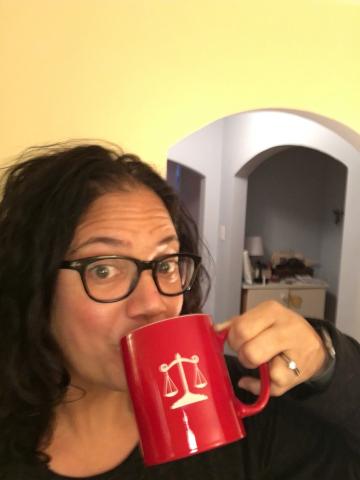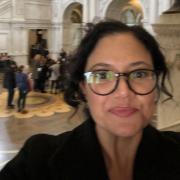
Yesterday in the waiting room at a therapist’s office, I met a chatty 4-year old. I told his parents he reminded me so much of my son five years ago. His mother sat up a little straighter. She turned to face me directly. She asked me to imagine I could go back and advise myself five years ago, knowing what I know now, what would I recommend? What has worked for my kid, helped him? I looked into her pleading, searching, anxious face. She got out a pen. I noticed her jovial, relaxed husband’s face, too. (And I immediately indulged in the assumption he was bathing in male privilege as the not-in-charge person not tasked with making it all ok. May not be true, but, I mean, yeah. I’m not in a great place with the patriarchy these days.)
When she asked me this very smart question, there was plenty I wanted to say. I’m quite chatty myself. However, I didn’t share anything. Most people in that office are getting help for a child who needs extra support in some way, but I don’t know what challenges and strengths their son has. It’s not my place to presume to know anything about their family’s or son’s journey. I have no idea what would be helpful.
That brief interaction stuck with me through the rest of the day and I started reflecting on my family now vs. five years ago. The biggest change, if I’m being honest, is that I always talked about “acceptance” and “inclusion,” but inside my heart, I always thought of therapies and services and educational accommodations with the goal of him “catching up” to other kids. His “delays” (aka just how he is) would be gone by the time he was eight. Or ten. Or twelve. One day he would shake off this mantle of weirdness and fully occupy the mandatory yet most elusive category – “normal.”
Looking back, my goals for him have profoundly changed. My advocacy for his best interests has changed as a result. My job today is to remove or mitigate obstacles his “disability” puts in his path, his path that leads to him fully becoming that most genuinely amazing thing he could be: himself. My job is to nurture his joy, the spark of pure spirit in him, and remind him how much love is always available to him, even when things are tough. My job is not to control the incredible process of his unfolding development. My job is to see where his road is bumpy and help him walk through those bumps, knowing he’s not alone and he can do it. When I do things that I used to think of as “interventions,” I do them to help him be himself, not to change him for other people’s comfort or benefit or approbation.
In 2011, with a dry throat and rapid heartbeat, I walked into a dingy City of New York conference room. I was terrified. I had a not-quite two-year old child who had been flagged at daycare as “different.” The daycare had filed the necessary paperwork on my behalf to get the city to pay for a full clinical assessment. Thanks, Big Apple. The reason the city has this generous policy, in part, is that when kids are found to have “disabilities,” then “interventions” work better if they get started as early as possible. I walked into the room, and they had already projected his results on a large screen. All his data was under the oversized heading, “Child with a Disability.” I remember just bursting into tears when I saw that, feeling so completely that something necessary for happiness was lost.
One of the best things about aging, for me anyway, is that I can look back at heightened moments when I felt something so strongly, and then I can see what actually occurred after that moment and see what my feelings were really about. In that conference room, I thought something devastating had been revealed. Today I can say with complete sincerity that we gained much more than we lost in that room that day. Nothing sad occurred. The information they shared has been enormously helpful and has taken me to wonderful places I could never have even known about if I never walked into that room.
The happiest I have felt in recent memory was during a recent trip to the NC Symphony’s annual Sensory Friendly concert for kids. It’s a place for kids who have trouble conforming to the behaviors expected of a symphonic audience. The conductor, musicians, and a cheerleader set a tone of goofy fun. Kids and adults moved their bodies, made noises, laughed, smiled. Some flapped their hands. Some yelled out the names of the instruments they noticed. The parents were happy and relaxed, getting a break from the stares and judgment of strangers and seeing their kid hear and love music and react in their own perfect ways. I saw a man in his 60s dancing with his son in his 30s, holding hands and giggling. There were quiet rooms for when it was too much. UNC Healthcare was handing out free squeeze toys for those who fidget. It was a moment when hundreds of people were at their very best, giving love, respect and acceptance to kids, to each other, to strangers, to themselves.
I guess what I have learned is that when you fully accept another person as they are, maybe especially your own child (onto whom I had projected so much), you see the whole world and yourself in much richer, more beautiful and more real way. When you or someone you love needs the world to be more patient, you become more patient with strangers too. You know you don’t know what’s going on with them. You notice when you’re reducing anyone to one interaction, one characteristic, and you give people more chances, acknowledging their complexity and your own. I remember one day when a teenager asked me if I like Herman’s Hermits in a very, very loud voice in an elevator in Manhattan. The other adults in the elevator snickered and tried to make mocking eye contact with me. They didn’t know, as I did, that he was leaving his social skills group for “neurodivergent” teens. His question was a brave and friendly act on his part. I told him I do like them very much and he told me all about his favorite songs.
I think when we shut the door on “normal,” we gained everything else. The world is just too big and beautiful for our labels and categories. It’s too big for language itself, which clumsily falters in attempts to describe the galaxy of humanity. Words like “different,” “delay,” “impairment,” “disability” “atypical” and my personal favorite, “disregulated,” are useless. They try to describe something only in opposition to what it is not, what it fails to be. These words are inaccurate because lurking behind and within them, there is not one definition, but two categories. One is desirable and one is unfortunate. “Different” needs “normal” to exist; otherwise, what does it mean?
My son’s qualities and abilities don’t exist in and can’t be described by categories. There are infinite categories. There are infinite things within each category. If your kid compulsively talks, think of the courage and stamina her day requires. I really can’t imagine how I would react if I received daily continuous negative feedback from my peers and authorities for doing something my brain told me to do that I couldn’t stop doing. Instead of putting that behavior in the “impairment” box as the “inability to control impulses,” add what it might feel like to live with a kid like that: funny, interesting, brave, patient, determined, exhausting, annoying, original, creative – and remember that these adjectives are dependent on the mood of the listener. How can it be described then? Infinite categories, no categories. It doesn’t matter. Words can’t tell you who anyone is. The only question that matters is: how can life be good for us right now? In this moment. How can we make it good for us?
I went to my son’s fourth grade curriculum night this week. The teachers proudly announced the class will take a special trip to see the NC Symphony. The kids are encouraged to dress up, behave formally and enjoy this posh adult affair. My kid can’t do any of that stuff. But guess what? It doesn’t matter, because we already went and we danced in the aisles and we talked out loud about how amazing “Peter and the Wolf” is while pretending we were conducting and it was fucking spectacular. So if I ever see that Mom who asked me for advice, I’ve decided I will tell her something. Love your kid, love yourself and try to have fun, that’s all I got.



The views and opinions expressed in this post are those of the author(s) and do not necessarily reflect those of MomsRising.org.
MomsRising.org strongly encourages our readers to post comments in response to blog posts. We value diversity of opinions and perspectives. Our goals for this space are to be educational, thought-provoking, and respectful. So we actively moderate comments and we reserve the right to edit or remove comments that undermine these goals. Thanks!